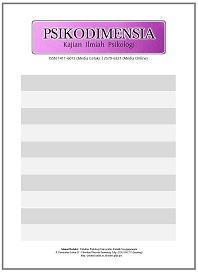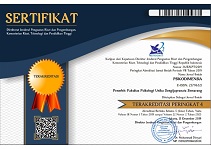Mindfulness dan Kepuasan Pernikahan pada Pasangan Suami Istri
Abstract
Adanya ketidaksesuaian akan peran dan harapan antara masing-masing pasangan dapat mengakibatkan ketidakpuasan dalam hubungan pernikahan, padahal kepuasan pernikahan sangat diperlukan sebagai fondasi utama bagi pasangan suami istri dalam membangun kehidupan rumah tangga melalui hubungan pernikahan yang bahagia dan harmonis. Sikap mindfulness dinilai dapat digunakan sebagai upaya untuk mencapai kepuasan pernikahan. Tujuan penelitian ini adalah untuk mengetahui hubungan antara mindfulness dengan kepuasan pernikahan pada pasangan suami istri. Penelitian ini menggunakan pendekatan kuantitatif korelasional dengan teknik sampling incidental sampling. Terdapat 156 subjek dalam penelitian ini dengan kriteria pasangan menikah yang telah mempunyai anak dan berusia 19-40 tahun. Alat ukur yang digunakan adalah ENRICH Marital Satisfaction Scale (EMS) dan Five Factor Mindfulness Questionnaire (FFMQ). Hasil penelitian menunjukkan bahwa terdapat hubungan yang signifikan antara mindfulness dengan kepuasan pernikahan dengan nilai r = 0,434; p < 0,01. Hasil ini bermakna semakin tinggi mindfulness pada individu maka semakin tinggi pula kepuasan pernikahan. Begitu pula sebaliknya apabila semakin rendah mindfulness maka kepuasan pernikahan yang dirasakan akan semakin rendah.
Keywords
Full Text:
PDF (Bahasa Indonesia)References
Ahmadi, A., Mustaffa, M. S., Haghdoost, A. A., & Alavi, M. (2022). Mindfulness and related factors among undergraduate students. Procedia Social and Behavioral Sciences, 159, 20-24. https://doi.org/10.1016/j.sbspro.2014.12.321
Baer, R. A., Smith, G. T., Hopkins, J., Krietemeyer, J., & Toney, L. (2006). Using self-report assessment methods to explore facets of mindfulness. Assessment, 13(1), 27–45. https://doi.org/10.1177/1073191105283504
Baer, R. A., Smith, G. T., Lykins, E., Button, D., Krietemeyer, J., Sauer, S., Walsh, E., Duggan, D., & Williams, J. M. G. (2008). Construct validity of the five facet mindfulness questionnaire in meditating and nonmeditating samples. Assessment, 15(3), 329–342. https://doi.org/10.1177/1073191107313003
Brown, K. W., & Ryan, R. M. (2003). The benefits of being present: Mindfulness and its role in psychological well-being. Journal of Personality and Social Psychology, 84(4), 822–848. https://doi.org/10.1037/0022-3514.84.4.822
Bühler, J. L., Krauss, S., & Orth, U. (2021). Development of relationship satisfaction across the life span: A Systematic review and meta-analysis. Psychological Bulletin, 147(10). https://doi.org/10.1037/bul0000342
Burpee, L. C., & Langer, E. J. (2005). Mindfulness and marital satisfaction. Journal of Adult Development, 12(1), 43–51. https://doi.org/10.1007/s10804-005-1281-6
Carson, S. H., & Langer, E. J. (2006). Mindfulness and self-acceptance. Journal of Rational - Emotive and Cognitive - Behavior Therapy, 24(1), 29–43. https://doi.org/10.1007/s10942-006-0022-5
Davis, D. M., & Hayes, J. A. (2011). What are the benefits of mindfulness? A Practice review of psychotherapy-related research. Psychotherapy, 48(2), 198–208. https://doi.org/10.1037/a0022062
Don, B. P., Algoe, S. B. (2020). Impermanence in relationships: Trait mindfulness attenuates the negative personal consequences of everyday dips in relationship satisfaction. Journal of Social and Personal Relationships, 37(8-9), 2419-2437. https://doi.org/10.1177/0265407520921463
Duvall, E. R. M., & Miller, B. C. (1985). Marriage and family development. Harper & Row.
Dwima, M. J. A. (2019). Pengaruh komunikasi efektif terhadap kepuasan pernikahan pada pasangan yang melakukan pernikahan dini. Cognicia, 7(4), 475–491. https://doi.org/10.22219/cognicia.v7i4.10466
Firmanto, A., & Pertiwi, R. (2023). Pengungkapan diri dan kepuasan pernikahan pada long-distance married couples. Psychopolytan, 7(1), 43-51. doi:https://doi.org/10.36341/psi.v7i1.3741
Fowers, B. J., & Olson, D. H. (1993). ENRICH marital satisfaction scale: A Brief research and clinical tool. Journal of Family Psychology, 7(2), 176–185. https://doi.org/10.1037/0893-3200.7.2.176
Fuente-Anuncibay, R. D. L., González-Barbadillo, Á., Ortega-Sánchez, D., & Pizarro-Ruiz, J. P. (2020). Mindfulness and empathy: Mediating factors and gender differences in a spanish sample. Frontiers in Psychology, 11(8), 1–11. https://doi.org/10.3389/fpsyg.2020.01915
Gabout, N., Harvey, F. M., Cyr, G., & Belanger, C. (2020). Cumulative childhood trauma and couple satisfaction: Examining the mediating role of mindfulness. Mindfulness, 11(5), 1723-1733. https://doi.org/10.1007/s12671-020-01390-x
Ghahremani, F., Doulabi, M. A., Eslami, M., & Shekarriz-Foumani, R. (2017). Correlation between number and gender composition of children and marital satisfaction in women presenting to health centers in Tehran-Iran 2015. Iranian Journal of Psychiatry and Behavioral Sciences, 11(2), 2-7. http://dx.doi.org/10.5812/ijpbs.9598
Girma, Z. (2020). The role of socio-demographic variables, sexual relationship, marital stability, marital communication and conflict resolution in marital satisfaction among married individuals in Addis Ababa, Ethiopia. Psychology and Behavioral Sciences, 9(6), 87. https://doi.org/10.11648/j.pbs.20200906.11
Green, A. A., & Kinchen, E. V. (2021). The effects of mindfulness meditation on stress and burnout in nurses. Journal of Holistic Nursing, 39(4), 356–368. https://doi.org/10.1177/08980101211015818
Hadits, A. F., Khasanah, A. N., Sri, M., Psikologi, R. P., & Psikologi, F. (2020). Mindfulness dan kepuasan perkawinan pada pasangan yang melaksanakan homeschooling mandiri. Prosiding Psikologi, 6(2), 668–673. http://dx.doi.org/10.29313/.v6i2.23978
Harahap, S. R., & Lestari, Y. I. (2018). Peranan komitmen dan komunikasi interpersonal dalam meningkatkan kepuasan pernikahan pada suami yang memiliki istri bekerja. Jurnal Psikologi, 14(2), 120. https://doi.org/10.24014/jp.v14i2.5603
Hurlock, E. B. (1980). Psikologi perkembangan. Jakarta: Erlangga.
Ismaeilzadeh, N., & Akbari, B. (2020). Effectiveness of mindfulness-based cognitive therapy in sexual self-efficacy and marital satisfaction among couples with marital conflicts. 1, 29–36. http://journal.um-surabaya.ac.id/index.php/JKM/article/view/2203
Ismail, F. (2018). Statistika untuk penelitian pendidikan dan ilmu-ilmu sosial. Jakarta: Prenadamedia Group.
Jannah, A. M. (2019). Hubungan mindfulness dan penerimaan diri pada remaja dengan orang tua tunggal. Skripsi.
Jones, K. C., Welton, S. R., Oliver, T. C., & Thoburn, J. W. (2011). Mindfulness, spousal attachment, and marital satisfaction: A Mediated model. The Family Journal, 19(4), 357–361. https://doi.org/10.1177/1066480711417234
Kabat-Zinn, J. (2003). Mindfulness-based interventions in context: Past, present, and future. Clinical Psychology: Science and Practice, 10(2), 144–156. https://doi.org/10.1093/clipsy/bpg016
Kappen, G., Karremans, J. C., Burk, W. J., & Buyukcan-Tetik, A. (2018). On the association between mindfulness and romantic relationship satisfaction: The role of partner acceptance. Mindfulness, 9(5), 1543–1556. https://doi.org/10.1007/s12671-018-0902-7
Karremans, J. C., Kappen, G., Schellekens, M., & Schoebi, D. (2020). Comparing the effects of a mindfulness versus relaxation intervention on romantic relationship wellbeing. Scientific Reports, 1–10. https://doi.org/10.1038/s41598-020-78919-6
Khoirot, U., & Sa’diyin, M. (2022). Pola komunikasi dalam penyelesaian konflik pasangan nikah muda di Desa Pangkah. Busyro : Jurnal Dakwah Dan Komunikasi Islam, 2(1), 9–14. https://doi.org/10.55352/kpi.v2i1.571
Kohn, J. L., Rholes, S. W., Simpson, J. A., Martin, A. M. L., Tran, S. S., & Wilson, C. L. (2012). Changes in marital satisfaction across the transition to parenthood: The role of adult attachment orientations. Personality and Social Psychology Bulletin, 38(11), 1506–1522. https://doi.org/10.1177/0146167212454548
Lenger, K. A., Gordon, C. L., & Nguyen, S. P. (2017). Intra-individual and cross-partner associations between the five facets of mindfulness and relationship satisfaction. Mindfulness, 8(1), 171–180. https://doi.org/10.1007/s12671-016-0590-0
Leonard, H. D., Campbell, K., & Gonzalez, V. M. (2018). The relationships among clinician self-report of empathy, mindfulness, and therapeutic alliance. Mindfulness, 9(6), 1837–1844. https://doi.org/10.1007/s12671-018-0926-z
Marheni, A. K. . (2019). Komunikasi interpersonal dalam pernikahan. Counsecling and Personal Development, 1(1), 11.
Maneesang, W., Hengpraprom, S., & Kalayasiri, R. (2022). Effectiveness of mindfulness-based therapy and counseling programs (MBTC) on relapses to methamphetamine dependence at a substance dependency treatment center. Psychiatry Research, 312(11). https://doi.org/10.1016/j.psychres.2022.114886
Moghadam, N. K., & Kazerooni. (2017). A study of mindfulness-based stress reduction’s effectiveness on marital satisfaction in women. International Journal of Health Sciences, 3(1), 36–39. https://doi.org/10.22100/ijhs.v3i1.149
Nouri, M., Mohadeseh, H. K., Frouzan, A., Ahmad, K., & Mohammad, A. (2019). Marital satisfaction and related factors among married women. International Journal of Health Sciences, 4(August 2017), 11–15. https://doi.org/10.22100/ijhs.v4i4.480
Odinka, P. C., Nduanya, U. C., Odinka, J. I., Muomah, R. C., Amadi, K. U., Ezeme, M. S., Nwoha, S. O., & Ndukuba, A. C. (2019). Socio-demographic variables, mindful awareness and marital satisfaction among nursing mothers in Southeast Nigeria. 10, 63–75.
Olson, D. H., Defrain, J., Skogrand, L. (2010). Marriages and families: Intimacy, diversity, and strengths (7th ed.). McGraw-Hill.
Onyishi, E. I., Sorokowski, P., Sorokowska, A., & Pipitone, R. N. (2012). Children and marital satisfaction in a non-Western sample: Having more children increases marital satisfaction among the Igbo people of Nigeria. Evolution and Human Behavior, 33(6). 771-774. http://dx.doi.org/10.1016/j.evolhumbehav.2012.06.005
Prasko, P. K. J., Holubová, M., Vrbova, K., Zmeskalova, D., Slepecky, M., & Grambal, A. (2017). Anxiety disorders and marital satisfaction. Neuroendocrinology Letters, 38(8), 555–564.
Putama, R. A. (2022). Kepuasan komunikasi pasangan sebagai variabel mediator pada pengaruh manajemen konflik terhadap kepuasan pernikahan. Disertasi doktoral, Program Pascasarjana Universitas Muhammadiyah Malang.
Rannu, A. R. A. D. (2020). Hubungan antara ekspektasi terhadap pernikahan dengan kepuasan pernikahan. Psikoborneo: Jurnal Ilmiah Psikologi, 8(2), 187. https://doi.org/10.30872/psikoborneo.v8i2.4899
Rahmananda, R., Adiyanti, M. G., & Sari, E. P. (2022). Kepuasan pernikahan pada istri generasi milenial di sepuluh tahun awal pernikahan. Jurnal Ilmu Keluarga & Konsumen, 15(2), 102-116. https://doi.org/10.24156/jikk.2022.15.2.102
Safira, J. A. (2022). Hubungan gaya resolusi konflik dengan kepuasan pernikahan pada pasangan commuter marriage. Skripsi. https://www.who.int/news-room/fact-sheets/detail/autism-spectrum-disorders
Shakir, A. Y. M., Aziz, D. A., & Carmergam, S. (2021). Financial well-being, mindfulness and marital duration as predictor of relationship satisfaction among married couples in Malaysia. Polish Psychological Bulletin, 52(4), 322-326. https://doi.org/10.24425/ppb.2021.139165
Shella, S., & Rangkuti, A. A. (2013). Pengaruh trait kepribadian terhadap penyesuaian perkawinan pada dewasa awal usia perkawinan 1-5 tahun. Jurnal Penelitian dan Pengukuran Psikologi, 2(2), 112-117.
Soraiya, P., Khairani, M., Rachmatan, R., Sari, K., & Sulistyani, A. (2016). Kelekatan dan kepuasan pernikahan pada dewasa awal di Kota Banda Aceh. Jurnal Psikologi Undip, 15(1), 36–42.
Remmers, C., Topolinski, S., & Koole, S. L. (2016). Why being mindful may have more benefits than you realize: Mindfulness improves both explicit and implicit mood regulation. Mindfulness, 7(4), 829–837. https://doi.org/10.1007/s12671- 016-0520-1
Retnoningtias, D. W., & Hardika, I. R. (2021). Menurunkan infertility-related stress dengan program mindfulness based stress reduction (MBSR). Jurnal Intervensi Psikologi, 13(1), 63-82. https://doi.org/10.20885/intervensipsikologi.vol13.iss1.art6
Riza, S. W. L., & Hermasti, R. A. G. (2021). Pengaruh body image terhadap kepuasan pernikahan pada wanita madya yang bekerja di PT X. Jurnal Mahasiswa Psikologi Universitas Buana Perjuangan Karawang, 1(2), 30–39.
Sorokowski, P., Id, M. K., Groyecka-bernard, A., & Kochan-wo, M. (2021). When and how does the number of children affect marital satisfaction ? An international survey. 1–14. https://doi.org/10.1371/journal.pone.0249516
Srisusanti, S., & Zulkaida, A. (2013). Studi deskriptif mengenai faktor-faktor yang mempengaruhi kepuasan perkawinan pada Istri. UG Jurnal, 7(6), 8–12.
Sugiyono. (2017). Metode penelitian kuantitatif, kualitatif dan R&D. Bandung: Alfabeta
Triningtyas, D. A., & Muhayati, S. (2017). Konseling pranikah: Sebuah upaya meredukasi budaya pernikahan dini di Kecamatan Pulung Kabupaten Ponorogo. JKI (Jurnal Konseling Indonesia), 3(1), 28–32. http://ejournal.unikama.ac.id/index.php/JKI
Vannier, S. A., & O’Sullivan, L. F. (2018). Great expectations: Examining unmet romantic expectations and dating relationship outcomes using an investment model framework. Journal of Social and Personal Relationships, 35(8), 1045–1066. https://doi.org/10.1177/0265407517703492
Veronika, M., & Afdal, A. (2021). Analisis kepuasan pernikahan pada pasangan suami istri yang bekerja. Jurnal EDUCATIO: Jurnal Pendidikan Indonesia, 7(1), 81. https://doi.org/10.29210/1202121150
Weliangan, H. (2022). Mindfulness and assertive communication effect towards husbands and wives marital satisfaction. International Journal of Research Publications, 104(1), 931–940. https://doi.org/10.47119/ijrp1001041720223564
Zaheri, F., Dolatian, M., Shariati, M., Simbar, M., Ebadi, A., & Hasanpoor Azghadi, S. B. (2016). Effective factors in marital satisfaction in perspective of Iranian women and men: A systematic review. Electronic Physician, 8(12), 3369–3377. https://doi.org/10.19082/3369
Zeidan, F., Johnson, S. K., Diamond, B. J., David, Z., & Goolkasian, P. (2010). Mindfulness meditation improves cognition: Evidence of brief mental training. Consciousness and Cognition, 19(2), 597–605. https://doi.org/10.1016/j.concog.2010.03.014
DOI: https://doi.org/10.24167/psidim.v23i1.11212
Print ISSN : 1411-6073 | online ISSN : 2579-6321 View My Stats

This work is licensed under a Creative Commons Attribution 4.0 International License.





















